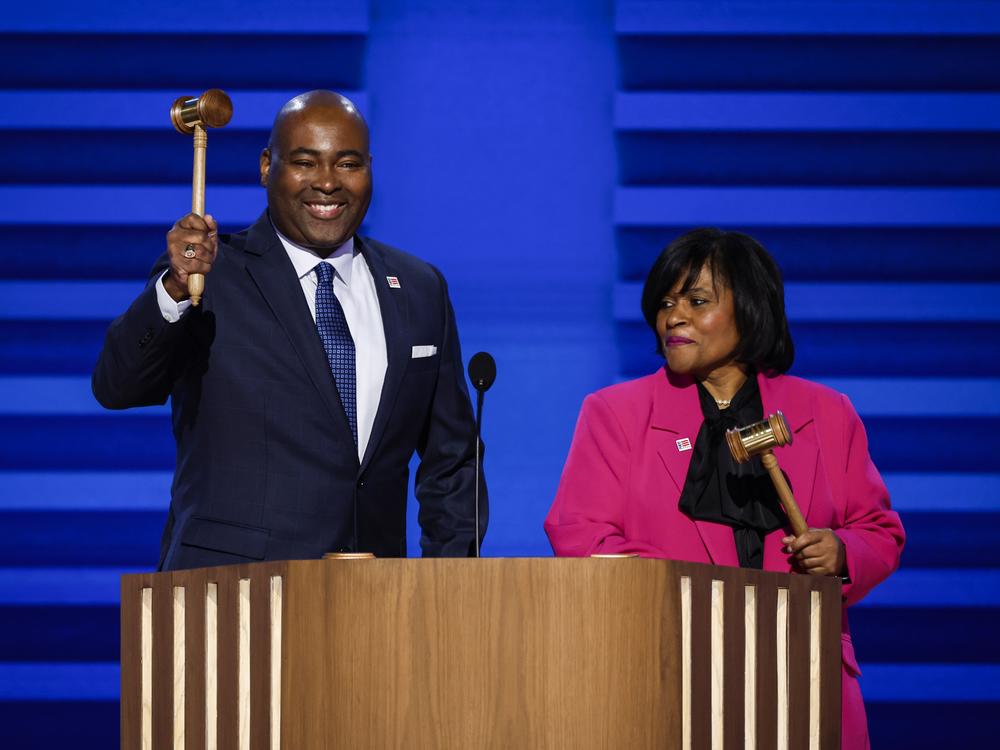Section Branding
Header Content
The DNC spotlights Black leaders who set the stage for Kamala Harris’ run
Primary Content
The NPR Network will be reporting live from Chicago throughout the week bringing you the latest on the Democratic National Convention.
Democrats will make history this week in nominating Vice President Kamala Harris as their choice for president — the first Black woman and Asian-American to secure the nomination in the party’s nearly 200-year-old history.
Democratic National Committee chairman Jaime Harrison and convention chair Minyon Moore, who are both Black, kicked off the event with remarks spotlighting past Black leaders who set the stage for Harris’ run.
“Every convention is a moment. It’s a moment that contributes to our movement,” he said, praising activist Fannie Lou Hamer and the first woman to run for president as a Democrat, Shirley Chisholm.
“All of these moments led us to this transformational moment when a Black convention chair and a Black DNC chair lead us in nominating a Black and AAPI woman to be the next president of the United States,” Harrison said.
Harrison and his sons, age 9 and 5, lead the convention in the Pledge of Allegiance
Civil rights leader and former Democratic presidential hopeful Rev. Jesse Jackson made a surprise appearance on stage at the DNC.
The 82 year old’s appearance, aided by a wheelchair, brought some convention goers to tears.
It was nearly 40 years ago that a 46-year-old, Rev. Jesse Jackson took the stage at the Democratic National Convention and gave his now-famous "Keep Hope Alive" speech.
Jackson's legacy hovered over the early proceedings at the DNC as speakers cited Jackson's run for president in the 80s several times in their remarks.
Jackson has devoted his life to fighting for civil rights. Last year, Jackson, who is now in his 80s, announced he would step down from his civil rights organization, the Rainbow PUSH Coalition, which he founded in 1971. He's been beset with health challenges in recent years, including a diagnosis of Parkinson's disease.
Jackson was a protégé of the Rev. Martin Luther King and became a leading voice in American politics and civil rights issues.
In 1971, he moved away from the King-founded Southern Christian Leadership Conference to form his own group, Operation PUSH (which later became the Rainbow-Push Coalition) in Chicago.
In his 1984 run, Jackson was largely seen as a fringe candidate. He managed to build support during his campaign and finished in third place for the Democratic nomination behind Walter Mondale and Gary Hart.
Four years later, in a second bid for president, Jackson again managed to exceed expectations. He finished behind the eventual Democratic nominee, then-governor of Massachusetts Michael Dukakis.
Jaime R. Harrison, chairman of the Democratic National Committee, shared the inspiration that Jackson sparked in him as a 12-year-old in 1988.
As a child, he didn't have much interest in watching the DNC, he said during a speech at the convention, but "When Rev. Jackson came on, I paid attention."
He said he saw himself in Jackson: "A Black man from South Carolina, raised by a single mother — that was me. [Jackson] challenged young people to hope and to dream."
Despite falling short in his pursuit of the nomination, speakers credited Jackson’s determination for leading the way to former President Obama’s success and now, to Harris.
Obama is scheduled to address the convention Tuesday.
Loading...

